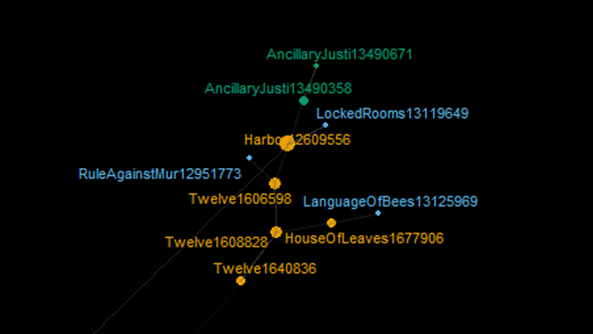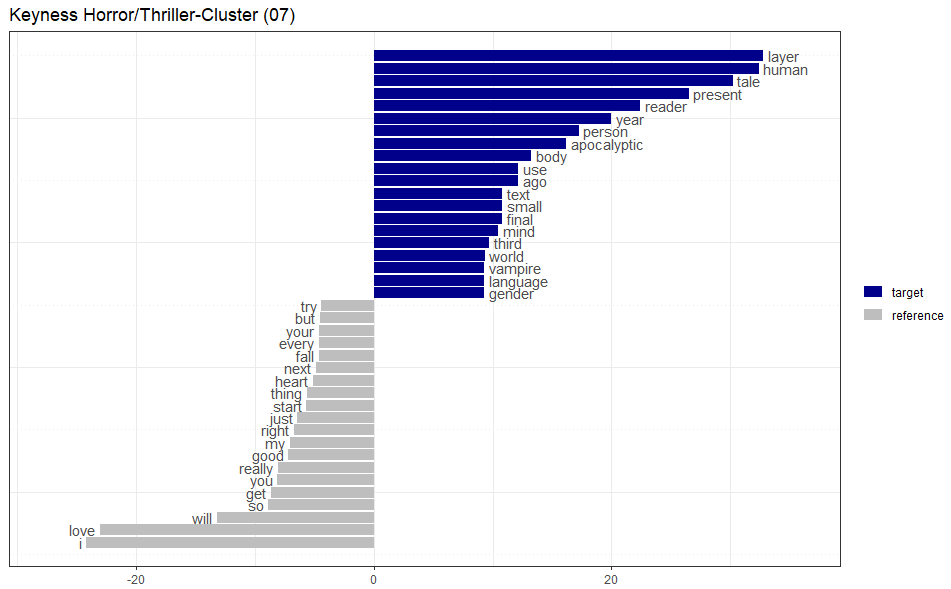
The Horror/Thriller Cluster (07) contains mostly Horror/Thriller reviews (5), which constitute half of the reviews in this cluster and 18 percent of all Horror reviews in the network, three Mystery reviews (12 % of all Mystery reviews) and two Science Fiction reviews (8 % of all Science Fiction reviews). It is connected to cluster 01 (Science Fiction) and 04 (Mystery). Notably, the direct connections are between nodes of the Horror/Thriller genre on both sides.
The absorption dimensions found most in this cluster are Attention and Impact, followed by General Sense of Absorption, Effortless Engagement, Anticipation Book Series and Lingering Story Feelings.

Most noticeably, there is no genre description in the keywords for this cluster. Secondly, the pronoun “I” is considered to be most unlikely to appear in this cluster. This is contrasted by the prominent role of the keyword “reader”. While there are few cases where “reader” refers to actual readers, namely the reviewers themselves, the fan community they feel being a part of, or potential readers that use their review for guidance: “I am not a fast reader” (Harbor12609556); “I join a rather large community of Cronin’s readers who eagerly await book three” (Twelve1640836); “I would be correct to advise the shallow reader of either type to look elsewhere” (Twelve1640836). The most common usage of the term, however, is to elevate the report of their experiences to the more abstract subject of the implied reader: “Louise Penny has a way of opening a lid on even the tightest container of deep-felt emotion, stirring it about, and helping the reader discover something they, perhaps, didn’t even know they’d been looking for.” (RuleAgainstMur12951773)
| Category | Keyword |
|---|---|
| Genre | none |
| Experience | reader, mind, world |
| General descriptors | layer, tale, third, person, text |
| Content | present, human, apocalyptic, person, vampire, human, animal, year, use, gender, language, small, mind, ago, body, world |
| Additional information | year, ago, final |
| Other | none |
This authoritative stand reflected in the more generalized description of the reactions of a “reader” in contrast to the narrower scope of “I” also manifests itself in comparison to cluster 01, where the hedging term “feel” was often used to describe readers’ thoughts about the book, whereas readers of this cluster use a more assertive tone: “It’s not that the reader is willing to suspend disbelief as much as it doesn’t occur to the reader that what she’s reading isn’t believable. Cronin creates a viral embodiment of vampirism that connects so well to the vampire mythos that the reader finds his stories perfectly plausible” (Twelve1640836).
Overall, the general descriptors give the impression that the vocabulary used is mimicking professional language: “layer”, “third”, “person” and “text”, which points to the reviews in this cluster placing higher value on stylistic features and the poetic quality of the text than on an easy and entertaining read. This value system is explicitly mentioned by one reviewer: “Yes I’m shallow because normally I need a main character who is somewhat personable to interest me in spending time with a story” (AncillaryJusti13490358). Accordingly, the word “love”, which in other reviews often describes the readers’ relationship to the characters, is largely underrepresented in this cluster. Moreover, despite readers unanimously praising the books they are reviewing, the term is rarely used even in this regard, indicating that reviewers in this cluster make an effort to state their admiration more eloquently: “House of Leaves is a unique achievement in literature.” (HouseOfLeaves1677906) – and criticizing themselves if they can’t maintain that standard: “I hate using this cliche, but I can’t put it down.” (Harbor12609556)
The book under review is certainly a big factor in producing this style of writing, as a discussion of “Broken passages, inverted text, arcane footnotes, and four layers of narration” (HouseOfLeaves1677906) is only possible if it is offered by the text. Yet a comparison of reviews on the same book reveals that this cluster might be equally shaped by the style of the individual reviewer. In this cluster, Locked Rooms is reviewed as: “I don’t care for narratives which shift from first to third person. It’s disconcerting and distracts away from the story. I understand it’s needed in this instance because Russell was not functioning properly throughout and Holmes became a bigger focal point, uncovering evidence the reader needs to see.“ (LockedRooms13119649) On the contrary, the same book clustered in cluster 04 with this reflection: “Also, I loved that we got to hear parts of the story from Holmes’s point of view. Usually we only get to hear what he’s thinking through Mary’s narration. But here we actually got to see through Holmes’s eyes, which was wonderful!” (LockedRooms13119495).